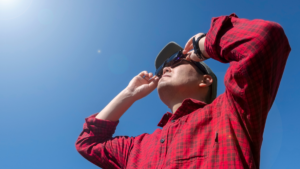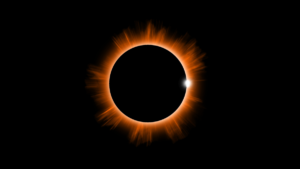A total solar eclipse¹ will cross the United States on April 4, 2024, passing over Texas, and traveling through Oklahoma, Arkansas, Missouri, Illinois, Kentucky, Indiana, Ohio, Pennsylvania, New York, Vermont, New Hampshire, and Maine. It will be a partial eclipse for us in Colorado, weather permitting!
It will be the last total solar eclipse visible from the contiguous United States until 2044! So, let’s get those peepers prepped for viewing.
Except during the brief total phase of a total solar eclipse, when the Moon completely blocks the Sun’s bright face, it’s not safe to look directly at the Sun without specialized eye protection for solar viewing.
Use approved solar eclipse viewers.
The only safe way to view a partially eclipsed sun is through special-purpose solar filters, such as “eclipse glasses“² or viewers that meet international standard ISO 12312-2 for safe viewing. Sunglasses, smoked glass, unfiltered telescopes or magnifiers, and polarizing filters are unsafe. Inspect your eclipse glasses or handheld viewer before use – if torn, scratched, or otherwise damaged, discard the device.
Technique of the pros.
Stand still and cover your eyes with your eclipse glasses or solar viewer before looking up. After viewing, turn away and remove your glasses or viewer — do not remove them while looking at the sun. If you normally wear eyeglasses, wear your eclipse glasses over them, or hold your handheld viewer in front of them.
Totality awesome.
Only within the path of totality—and once the moon completely blocks the sun—can eclipse viewers safely be removed to view totality. Once the sun begins reappearing, however, viewers must be replaced. This will not be the case here in Colorado, so your viewers should be worn the entire time.
Visit your doctor of optometry.
If you should experience discomfort or vision problems following the eclipse, contact an optometrist immediately to schedule a comprehensive eye exam. Some common symptoms include:
- Loss of central vision, or solar retinopathy,
- Distorted vision, and
- Altered color vision.
Keep in mind, eclipse glasses are NOT regular sunglasses – regular sunglasses, no matter how dark, are not safe for viewing the sun.
For any more information on how to keep your eyes protected and healthy now or any other time of the year, reach out to an optometrist near you!

Are Your Eyes Ready for the Upcoming Total Solar Eclipse?
March 6, 2024
No Comments
A total solar eclipse¹ will cross the United States on April 4, 2024, passing over Texas, and traveling through Oklahoma, Arkansas, Missouri, Illinois, Kentucky, Indiana, Ohio,

The Time Has Come to Use Your Health Benefits!
November 6, 2023
No Comments
Have you made good use of your health benefits this year? If not, consider using your Health Savings Accounts (HSA) or Flexible Spending Accounts (FSA)

Winter is Coming – So Are Dry Eyes
October 5, 2023
No Comments
Brace yourselves, winter is coming and so are dry eyes! Winter weather conditions are one of the leading causes for dry eye symptoms. This is

Eye Safety and the Solar Eclipse
September 12, 2023
No Comments
Did you know that there will be an annular solar eclipse happening on October 14, 2023? That’s right, and most of Colorado will be able

Time to Use Your Health Benefit Funds
October 31, 2022
No Comments
The end of the year is fast approaching, and your health benefits are expiring! You might already be feeling anxiety for the upcoming holiday season,

Tips for Dry Eye Relief
September 27, 2022
No Comments
Did you know that between 16 million and 49 million Americans have dry eyes? This is between 5-15% of the population!¹ Dry eye symptoms are